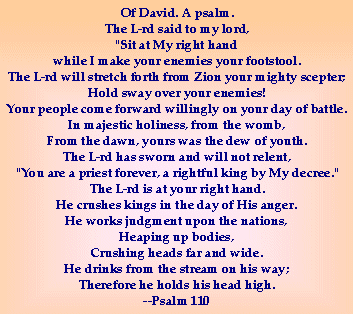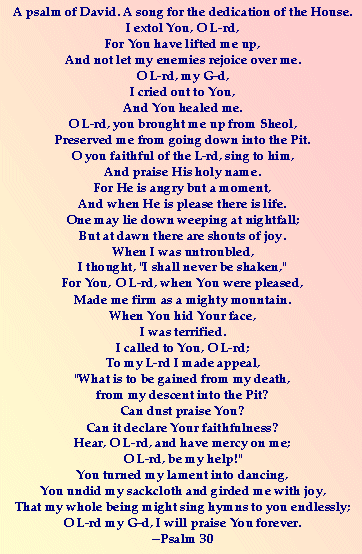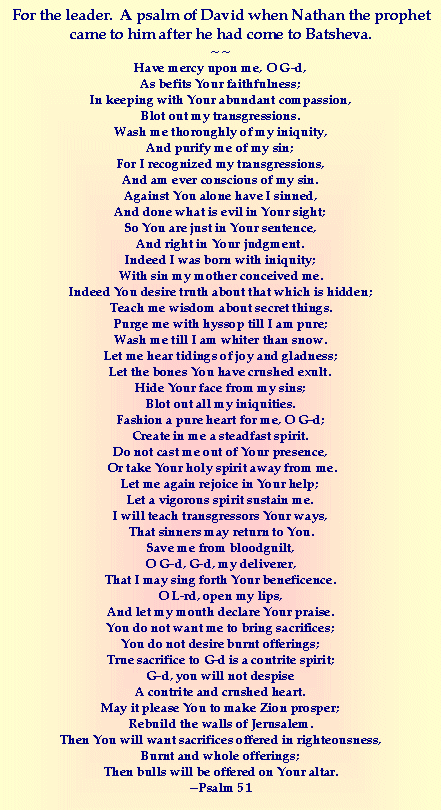
I Will Praise the L-rd!
by
~Miriam~

I Will Praise the L-rd!
by
~Miriam~
Does G-d need to hear our praise of Him? Of course, the answer to this question is: no. He does not need our praise, but we need it. What is the purpose of praise? How does it function, and what does it do for us? Praise is the proper beginning of any prayer of faith, for effective prayer is one said in the strength of faith. Praise builds that faith by reminding us of HaShem's love and His power to bring what we pray to fruition. In the Tanakh we are given examples of praise and the prayer of faith, from which we are to learn, and the precepts to incorporate into our lives.
When Ya'akov married Leah, he thought he was marrying Rachel. Ya'akov confronted their father, Laban about the deception, and he answered that the younger could not be married before the older. Leah was said to have "weak eyes", which the Midrash attributes to her crying for years over the accepted belief that she, the older, would marry Esau, Ya'akov's older brother, while Rachel, the younger, would marry Ya'akov. For Leah, this marriage was a wonderful reprieve from the fate that she spent her life crying in prayer to be spared. However, Ya'akov was not pleased with the surprise of waking up on the morning following his wedding to discover Leah in place of Rachel. Although he accepted her as his wife, he still blamed her, along with her father, for the deception. Leah's first son, conceived on her wedding night, was named Reuben, for she said, "The L-rd has seen my affliction; now my husband will love me". When her next son was born she named him Shimon, declaring, "This is because the L-rd has heard that I was unloved and has given me this one also." Her third son was named Levi, as she declared, "This time my husband will become attached to me, for I have borne him three sons."
Leah's spiritual growth can be seen in the names she chose for her sons. With each of her first three sons' births Leah's eyes were on Ya'akov, as she yearned for his love. With Reuben's birth she thought: "Now my husband will see me." With Shimon's birth she thought: "Now my husband will hear me." With Levi's birth she thought: "Now my husband will become attached to me." Her love for Ya'akov was unrequited and left her yearning for the love she saw extended to Rachel. Yet Leah did not let this situation defeat her, as is seen in the naming of her fourth son, Yehudah. When he was born she declared: "This time I will praise the L-rd!"--Genesis 29:35. She took her eyes off Ya'akov and her unhappy marriage and let her heart soar in praise. The birth of the tribe that would bring forth the kings of Israel was wrapped up in thanksgiving and praise-praise of spiritual maturity that could lay aside feelings concerning the circumstances and simply thank HaShem. This concept, brought forth the first time by Leah Immenu, is called hoda'ah, the word from which the name Yehudah is derived, and is at the very core of the malchut (kingship) of Israel.
Hoda'ah also encompasses the idea of modeh, or thanksgiving, so deep that one's heart is open before HaShem. This concept enables a person to make confession and repent with true joy. This is seen in the story of Yehudah and Tamar (Genesis 38). Once he realized he was guilty, he did not hesitate to admit it and make restitution. This was also true in the case of David and Batsheva. He did not try to cover his sin, but rather confessed and genuinely repented. Although this realization of wrong-doing causes initial sorrow over the sin, true repentance brings joy, for it repairs the damage done by the sin and brings a person back into a place of closeness to HaShem. This is characteristic of the greatest kings of Israel, all descended from Leah's son Yehudah.
 King David is the example of praise in action. Throughout the ages the psalms he wrote have lifted hearts in praise and worship. Even though he committed some very grave sins, no one praised HaShem like King David. G-d loved David and promised him that his house would build the Temple and rule Israel forever (I Samuel 7:8-16). Ezekiel, too, foretold the coming of the Mashiach in chapter 34 thusly: "Then I will appoint a single shepherd over them to tend them-My servant David. He shall tend them, he shall be a shepherd to them. I the L-rd will be their G-d, and My servant David shall be a ruler among them-I the L-rd have spoken." (vs.23-24) David is the archetype of Mashiach for all time; the Mashiach to come will also speak in songs of praise, just as did King David.
King David is the example of praise in action. Throughout the ages the psalms he wrote have lifted hearts in praise and worship. Even though he committed some very grave sins, no one praised HaShem like King David. G-d loved David and promised him that his house would build the Temple and rule Israel forever (I Samuel 7:8-16). Ezekiel, too, foretold the coming of the Mashiach in chapter 34 thusly: "Then I will appoint a single shepherd over them to tend them-My servant David. He shall tend them, he shall be a shepherd to them. I the L-rd will be their G-d, and My servant David shall be a ruler among them-I the L-rd have spoken." (vs.23-24) David is the archetype of Mashiach for all time; the Mashiach to come will also speak in songs of praise, just as did King David.
Now the spirit of the L-rd had departed from Saul, and an evil spirit from the L-rd began to terrify him. Saul's courtiers said to him, "An evil spirit of G-d is terrifying you. Let our Lord give the order and the courtiers in attendance on you will look for someone who is skilled at playing the lyre; whenever the evil spirit of G-d comes over you, he will pay it and you will feel better...." Whenever the evil spirit of G-d came upon Saul, David would take the lyre and play it; Saul would find relief and feel better, and the evil spirit would leave him.Saul was being tormented by a demonic presence, but whenever David would play the lyre for him, the presence would leave. This is a lesson is the power of musical praise. The soul is eased by it by being freed of any tormenting presence. The demon could not stay. We can learn from this story that praise has a vital role in deliverance of the soul from this type of torment. There are other psalms as well that are spiritual protection, shielding the soul from onslaughts of a spiritual enemy. Psalm 91 is attributed to Moses, as a prayer for protection as he ascended to receive the Torah from heaven. This psalm is a good meditation for spiritual protection.
--I Samuel 16:14-16,23

David whirled with all his might before the L-rd; David was girt with a linen ephod. Thus David and all the House of Israel brought up the Ark of the L-rd with shouts and with blasts of the horn.
--II Samuel 6:14-15
 David danced before the Ark with great joy, whirling with all his might. His praise was one of thanksgiving and triumph in the victory of the L-rd. The Ark had been captured by the Philestines during the time of Samuel the Prophet (I Samuel 4-6). Then when they sent it back to Israel, it had been kept at the house of Abinadab during Saul's reign. After Abinadab's son, Uzzah died after touching the Ark, it stayed in the house of Obed-edom. When David heard that Obed-edom's house was being blessed, he realized he needed to bring the Ark to the City of David. This time the Ark was moved properly, with bearers, rather than on an ox cart, as it had been the previous times. The procession was one of great joy, led by the king, himself. The glory that had departed in the day of the High Priest Eli, had returned to Israel. This praise was one of thanksgiving, of love of HaShem, of celebration and joy in His Presence. Singing and dancing before the L-rd is a form of thanksgiving that is seen several times in the Tanakh, such as the dancing and singing at the Red Sea (Exodus 16). Yet this dance and song of King David stands out as the prime example of dancing before the L-rd. When his wife, Michal, spoke out her disapproval of his display, he answered her: "....I will dance before the L-rd and dishonor myself even more, and be low in my own esteem..." (II Samuel 6:22). So deep was David's love of G-d that he didn't care what people might think of him; his first concern was honoring G-d with a display of his adoration.
David danced before the Ark with great joy, whirling with all his might. His praise was one of thanksgiving and triumph in the victory of the L-rd. The Ark had been captured by the Philestines during the time of Samuel the Prophet (I Samuel 4-6). Then when they sent it back to Israel, it had been kept at the house of Abinadab during Saul's reign. After Abinadab's son, Uzzah died after touching the Ark, it stayed in the house of Obed-edom. When David heard that Obed-edom's house was being blessed, he realized he needed to bring the Ark to the City of David. This time the Ark was moved properly, with bearers, rather than on an ox cart, as it had been the previous times. The procession was one of great joy, led by the king, himself. The glory that had departed in the day of the High Priest Eli, had returned to Israel. This praise was one of thanksgiving, of love of HaShem, of celebration and joy in His Presence. Singing and dancing before the L-rd is a form of thanksgiving that is seen several times in the Tanakh, such as the dancing and singing at the Red Sea (Exodus 16). Yet this dance and song of King David stands out as the prime example of dancing before the L-rd. When his wife, Michal, spoke out her disapproval of his display, he answered her: "....I will dance before the L-rd and dishonor myself even more, and be low in my own esteem..." (II Samuel 6:22). So deep was David's love of G-d that he didn't care what people might think of him; his first concern was honoring G-d with a display of his adoration. David's character baffled others besides his wife, Michal. After he had sinned with Batsheva, the baby born to her was very ill (II Samuel 12). David fasted and prayed and spent the night lying on the ground. When the child died, the servants were afraid to tell him, saying to each other: "We spoke to him when the child was alive and he wouldn't listen to us; how can we tell him that the child is dead? He might do something terrible." (vs. 18) When David heard their whispers, he knew the baby had died. He didn't react in a "normal" way, as the servants had expected, however. Instead he got up, bathed, changed his clothes, then went into the House of the L-rd and prostrated himself. His servants asked him why he behaved in such an abnormal way. He answered: "While the child was still alive, I fasted and wept because I thought: 'Who knows? The L-rd may have pity on me, and the child may live.' But now that he is dead, why should I fast? Can I bring him back again? I shall go to him, but he will never come back to me." (vs. 22-23) Totally submissive to the will of G-d, he offered a "sacrifice of praise". He laid aside his own feelings and praised the L-rd, accepting His verdict as superior to his own will.

Jehoshaphat stood and said, "Listen to me, O Judah and inhabitants of Jerusalem: Trust firmly in the L-rd you G-d and you will stand firm; trust firmly in His prophets and you will succeed." After taking counsel with the people, he stationed singers to the L-rd extolling the One majestic in holiness as they went forth ahead of the vanguard, saying, "Praise the L-rd, for His steadfast love is eternal." As they began their joyous shouts and hymns, the L-rd set ambushes for the men of Amon, Moab, and the hill country of Seir, who were marching against Judah, and they were routed. The Ammonites and Moabites turned against the men of the hill country of Seir to exterminate and annihilate them. When they had made an end of the men of Seir, each helped to destroy his fellow.The armies of Ammon, the Moab, and the hill country of Seir were coming against Judah. King Jehoshaphat had returned to Jerusalem from a battle against the Arameans, in which King Ahab of the northern kingdom of Israel, had been killed.
--II Chronicles 20: 20-23
 He knew he could not assume he would win, and he was, therefore, frightened. He had insisted on consulting the L-rd before that battle, as well, and was told by the prophet, Micaiah, that they would lose, which they did. This time he consulted the L-rd with a proclaimed period of national fasting and praying. The answer of the L-rd was: "Give heed, all Judah and the inhabitants of Jerusalem and King Jehoshaphat; thus said the L-rd to you, 'Do not fear or be dismayed by this great multitude, for the battle is G-d's, not yours. March down against them tomorrow as they come up by the Ascent of Ziz; you will find them at the end of the wadi in the direction of the wilderness of Jeruel. It is not for you to fight this battle; stand by, wait, and witness your deliverance by the L-rd, O Judah and Jerusalem; do not fear or be dismayed; go forth to meet them tomorrow and the L-rd will be with you.'" (vs.15-17) This scene of singers to the L-rd proceeding the armies is our example of spiritual warfare. The battle is G-d's, not ours. This praise of faith in the face of the enemy is our part in the battle. The armies of Judah just had to watch, as the enemies turned on each other and totally annihilated one another. The battle was already won in heaven. The praise was a song of "Amen", "Let it be so, as it has been decided and written in heaven."
He knew he could not assume he would win, and he was, therefore, frightened. He had insisted on consulting the L-rd before that battle, as well, and was told by the prophet, Micaiah, that they would lose, which they did. This time he consulted the L-rd with a proclaimed period of national fasting and praying. The answer of the L-rd was: "Give heed, all Judah and the inhabitants of Jerusalem and King Jehoshaphat; thus said the L-rd to you, 'Do not fear or be dismayed by this great multitude, for the battle is G-d's, not yours. March down against them tomorrow as they come up by the Ascent of Ziz; you will find them at the end of the wadi in the direction of the wilderness of Jeruel. It is not for you to fight this battle; stand by, wait, and witness your deliverance by the L-rd, O Judah and Jerusalem; do not fear or be dismayed; go forth to meet them tomorrow and the L-rd will be with you.'" (vs.15-17) This scene of singers to the L-rd proceeding the armies is our example of spiritual warfare. The battle is G-d's, not ours. This praise of faith in the face of the enemy is our part in the battle. The armies of Judah just had to watch, as the enemies turned on each other and totally annihilated one another. The battle was already won in heaven. The praise was a song of "Amen", "Let it be so, as it has been decided and written in heaven."
Only by learning the examples of praise and putting them into practice can a person build a strong spiritual life, a relationship with HaShem based on solid faith. Praise takes many forms and flows with our emotions, or in spite of them. It is the standing in faith, believing that G-d's word is true and His love and care are dependable and eternal. We give Him thanks and honor in the good times and the bad. Praise puts our fears to flight and breaks down the barriers that keep blessings from flowing to us. Praise enables us to confess our sins; and therefore helps us keep a clean account before G-d. Praise is spiritual warfare in the face of insurmountable odds. Like Leah's, our praise can turn the situation within ourselves around and make our lives, not just more bearable, but triumphant. Like David's example, praise can come into every part of our lives, celebrating victory or turning sorrow to gladness, simply spending time recounting HaShem's wonders or putting a demonic presence to flight. As in Jehoshaphat's case, we can see battles miraculously fought for us, as we exalt our great G-d through words of praise, song, dance, and music. Examples of praise are in the Tanakh, because HaShem wants us to mature and partake of the higher fruits of spiritual life, just as our forefathers did. Like the mitzvot (laws), these examples are not simply pleasant reading, but meant to be incorporated into our daily experience. Just as physical exercise strengthens muscles and enables one to manage heavier burdens, exercising praise strengthens our faith and enables us to handle heavier spiritual burdens.

| PROPHECY | HEBRON | POETRY CORNER | HOME |